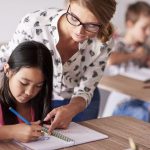Social and emotional learning is an approach to education that has been growing in popularity, focusing on creating a safe and positive learning environment that fosters an ability to succeed not just in school, but in careers and throughout life.
With schools that are growing more diverse, with students from multicultural backgrounds, different social upbringings, and a range of economic circumstances, it can help children better engage in learning, positive behavior, and social engagement with peers. But what is the impact of social & emotional learning (SEL) on student achievement? Here, we’re going to look at how SEL also provides a positive influence on academic performance.
What is social & emotional learning?
Studies have shown that SEL can help improve academic achievement by 11 percentile points on average, besides improving socially cohesive attributes, such as sharing and empathy and combating mental health issues like stress and anxiety. But how does it do this? Through working with schools, families, and throughout the communities, SEL takes an approach of developing five key skills that can greatly improve the attitudes of students towards schools. The five skills are as follows:
Self-awareness: Understanding of one’s emotions, goals, and values. By assessing our strengths and shortcomings, we can improve our mindsets regarding our own performance, leading to optimism and improved self-esteem
Self-management: When we are more aware of the connections between our thoughts, feelings, and actions, we can better regulate them. Skills like stress management, delaying gratification, and impulse control help students manage their own reactions and keep a positive, productive mindset when faced with challenges, especially in school.
Social awareness: Better understanding social norms in a given context, such as school, family, and the wider community, as well as awareness of support and resources available can help us be more connected to our network, helped with lessons on empathy, compassion, and understanding those in different circumstances.
Relationship skills: With social awareness opens the door to fostering healthier relationships. Building relationship skills like active listening, communication skills, cooperation, and conflict negotiation can help us build a network of more rewarding relationships with peers and teachers.
Responsible decision making: Learning how to make constructive choices when it comes to behavior, interactions, and academic goals. This includes learning now just how to set achievable aims but also to address ethics, safety, and behavioral norms regarding the situation. Better evaluations of actions and consequences can help students stay safe and responsible.
To many of us, these behaviors may seem intuitive. However, they need to be learned and need to be taught. By assuming that all students come to school with these skills already ingrained in them is to put them at an automatic disadvantage compared to their peers. This can lead to major differences in academic achievement between students. How does SEL and the skills mentioned above contribute to achievement in the classroom and beyond?
How SEL contributes directly to achievement
As mentioned, a meta-analysis of schools, parents, and students that have incorporated social & emotional learning practices has shown an average of an 11 percentile point rise in students’ achievement scores. The range of soft skills learned through SEL contribute to this greatly, but one of the primary benefits is the change in attitude towards school. Understanding the importance of responsible decision making in school, being more aware of their own habits and how to control them, and the rewards that come with delayed gratification and better relationships in the school make a direct impact on academic achievement.
Social cohesion and academic success
Better awareness of social norms and appropriate behavior can help prevent students from inappropriate interactions that can sabotage their relationships with peers, teachers, and parents. This can prove a roadblock to the positive relationships that help create better attitudes towards schools and may make it harder to develop productive bonds with teachers, meaning they get less attention in the classroom. SEL can help students get along better with others and can develop the close student-teacher relationships that are a crucial ingredient of academic achievement. These close relationships encourage students to perform better, to embrace challenges, to seek help when they need it. Furthermore, they can lead to outcomes like references when going into further education or the workforce, helping students achieve well beyond the classroom.
Behavioral improvement and achievement
Many a teacher, parent, guardian and even student are aware that behavioral problems can impede achievement. Behavioral infractions in the class can lead to missed school time, actively sabotaging their education. Furthermore, acting inappropriately due to poor impulse control can damage the relationships a student has with their peers and teachers, negatively impacting their attitudes towards school in the long-term. SEL students are overall less aggressive and less disruptive in school, as well as being less likely to have behavior and substance abuse problems before the age of 25.
Mental health and academic success
School can be a stressful time for any student, at any age. Changes in one’s own personality and perspective, as well as a shift in our own social positioning can manifest in many negative ways. Mental health issues like depression, anxiety, stress, and social withdrawal are on the rise, specifically in teenagers and most especially in teenage girls. Students engaged in social & emotional learning show fewer occurrences of these problems across the board. This is due in part to self-management skills like planning, improved attention spans, and the ability to control their own impulses and reflect on their own thoughts. Given how mental health can greatly affect our self-esteem as well as our ability to devote more attention to a task, it should be no surprise these changes can lead to better academic achievement.
Ongoing studies are continuing to prove what those engaged with social & emotional learning have already known for some time. Teaching the skills that often get left behind in the classroom can help even the playing field for a range of students from different cultural, social, and economic backgrounds, making a positive impact on achievement for everyone involved.





